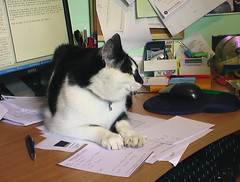Another nice plagiarism tutorial, this time from the University of Leicester

Pippin still likes to “help”

Another nice plagiarism tutorial, this time from the University of Leicester

Pippin still likes to “help”
Picked up on the plagiarism mailing list – “a new wiki resource summarising research & effective practice in dealing with plagiarism & collusion” from Kevin Brace, HE Co-ordinator.JISC Regional Support Centre West Midlands, University of Wolverhampton.

a closer view of this lovely fungus!
Again from the plagiarism list – a guide to referencing from UWE. I’ll be adding these links to our Information Literacy Toolkit as soon as I have time.

“Big Grey” from Darryl in WA
Chrsitine Irving and John Crawford have just announced their new blog , relating to their information literacy project. “The aim of the blog is to give the project a medium for sharing news and comment about activities and developments relevant to the project and Information Literacy with our cross sector partners and interested parties.”

Shaggy pholiote in my garden
Pat Gannon-Leary and I are in the process of writing a workshop for library staff on how we can support researchers who are writing for publication. We’re planning to present participants with different perspectives, so we’re gathering data at the moment from researchers at different stages in the research process, from journal editors and from library staff. We are asking each of them “one thing” they would like to know (researchers)/ would recommend (editors)/ would do to help (library staff) in the writing for publication process. Hopefully we shall end up with some useful research data as well as an interesting workshop.
If anyone reads this post and would like to contribute, then I’d be delighted to hear from you.
Alison McNab alerted me to the existence of Zotero in a recent email highlighting a lawsuit currently in progress between it’s creators and Thomson Reuters, producers of Endnote. As the Endnote support person here at Newcastle I thought I should know more about Zotero and at first glance, I can see why Thomson Reuters might be worried! It is a free Firefox extension which does pretty much what Endnote does and which lives in the web browser itself. So far, I have just listened to their audio tour, but I’m looking forward to exploring it more as it looks very user friendly (maybe not quite the outcome Thomson Reuters are hoping for from the lawsuit!)

Pont du Gard, France (summer hols again!)
Wow, a whole month since I posted a comment on my blog. I don’t expect there’s anyone still reading it now! I blame the fact that I’ve been too busy doing the job to spend time blogging about it, but I promise to try harder.
Anyway, I thought people might be interested in Phil Race’s blog on assessment, learning and teaching in HE. Phil has moved his blog and Google keeps pointing folks to his old site, but this link will take you to the new one and an interesting document on Making Learning Outcomes Work. Phil talks about eight factors which should be clearly evident to students – who, what, how, why, when, where, so what and wow (You’ll have to read his article to find out what they mean!)
It’s just a useful reminder for those of us just about to enter the busiest period of info lit teaching of the year.

The Tour of Britain in Durham
I see that the Google Chrome web browser has been launched today (competition for Internet Explorer and Mozilla Firefox). It’s specifically designed to run web 2.0 apps more effectively. I’ve downloaded the beta and it’s a very clean and unfussy interface.

Tree frog in the Carmargue
This ACRL webpage caught my attention at the same time as an article by Mark Hepworth and Marian Smith entitled “Workplace information literacy for administrative staff in HE” published in the Australian Library Journal 2008 57(3) 212-236. I haven’t had time to read Mark and Marion’s article yet, but I note that it is making comparisons with the JISC i-skills model. IL for admin, technical and secretarial staff in HE is an area which I am currently thinking about, as I am in the process of setting up some workshops for the admin staff in the Faculty with which I liaise, probably starting with something very practical, like an EndNote workshop, but hopefully also covering some broader IL skills and concepts. I’d be interested to know if any other libraries are developing anything similar or have experienced an increased demand for this type of help.

Coypu in the Carmargue, France
I’ve just come across Jane Secker’s article in Serials 21(2) July 2008 p112-115. To quote from her abstract: This paper provides an overview of the University of London’s Libraries and Social Software in Education (LASSIE) Project, led by LSE and the Institute of Education. The project explored whether social software, or Web 2.0 technologies, could enhance distance learners’ experience of libraries. LASSIE also undertook five case-studies to explore in more detail: social software and reading lists; social bookmarking and libraries; podcasting and information literacy; blogging; and Facebook and libraries. It concluded that social software might be best utilized to enhance information literacy support for distance learners.

Water jousting, Meze, France